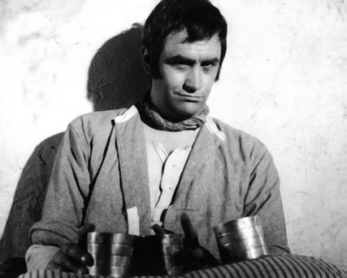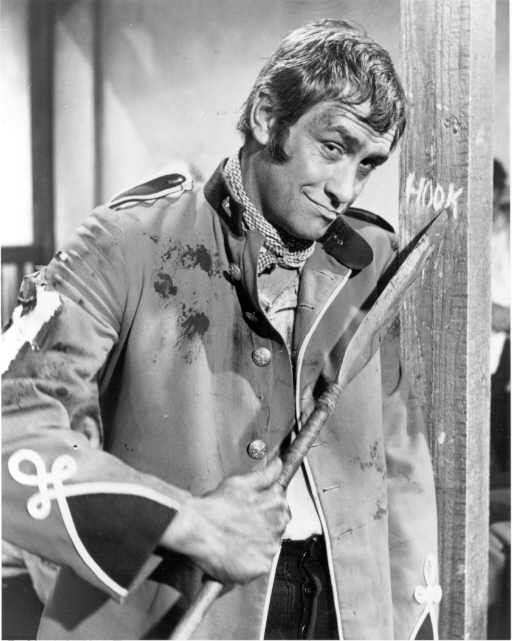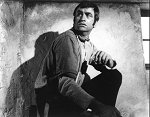

Zulu (1964)
“Dwarfing the mightiest! Towering over the greatest!”
Those adorable taglines accurately describe Zulu’s place in my heart. Maybe it’s not The Best Film Ever Made (whatever that means) but it is without a doubt the one I love most. I’ve seen it so many times I know the whole thing by heart, yet it still has the power to move me.
Zulu tells the true story of the Battle of Rorke’s Drift, a legendary event of little historical consequence but much emotional appeal. A hundred and fifty British soldiers stationed at a hospital/supply dump in 19th century South Africa have just a few hours to prepare for attack by four thousand Zulus. Though fully expecting to be wiped out, like a much larger British force annihilated by Zulus only hours earlier at nearby Isandhlwana, the tiny garrison survives thanks to good planning and fighting so heroic it set a record for the most Victoria Crosses awarded in a single action.
The atmosphere of the film is Kipling-meets-Sartre, with a lot of existential questioning and no jingoism. Some of the characters express loyalties or antagonisms based on region, class, rank, and even race, but the movie itself is high-minded and intelligent about such issues and even now, decades later, feels up-to-date politically. Life is absurd, war particularly so, but people are basically decent. Mercy and universal brotherhood are the timeless values that come through, making Zulu an uplifting, inspiring experience.
Zulu's moral beauty is matched by its formal beauty. Filmed on location in Natal in wide-screen Technicolor, it delights the eye with adroit camera work, gorgeous costumes, breathtaking scenery, and perfectly-composed tableaux of battlefield action. The pounding orchestral score by John Barry conveys a sense of struggle and valor. A strong script and brilliant performances all around make us believe in and care about the characters.
Though Zulu stages the battle pretty accurately, it invents most of the story's dramatic details. Memorable moments like the Zulu mass-wedding, the battlefield "singing contest," and the final Zulu "salute" are pure fiction. So are the characterizations.
The most controversial invention is "Hooky," the interpretation of Private Alfred Henry Hook as played by James Booth in the film's most thoroughly-developed subplot. A Cockney thief sentenced to military service, who retaliates by malingering and insubordination, Hooky is the film's one rebellious character--an explosive bundle of earthy humor, cynical intelligence, and rage. He fights only reluctantly, but bravely enough to win Britain's highest military decoration, making him the quintssential Booth character: a heroic antihero and “charming rogue” par excellence. The real Hook was, apparently, nothing like this. His descendants insist (and Zulu War buffs never tire of repeating) that Hook was a model soldier, teetotaler, and family man. But Zulu depicts enough "team players"; Hooky serves as a vivid, engaging reminder that the locus of value is the individual. He occasions the best performance of James Booth’s career, and is the main reason Booth is remembered today.





The now-familiar story is that Michael Caine arrived to audition for the part of Hook, but found that James Booth had already been cast. Another version of the story maintains Caine was considered but rejected because he didn’t look butch enough. Both versions agree that Caine was offered the role of Bromhead almost as an afterthought. However these casting decisions were made, the outcome is perfect. Caine's gorgeous, snotty Bromhead made him a star, while James Booth--dark, rugged, oozing with masculinity and dangerousness--was obviously born to play the physically demanding part of Hook. Booth seems strong and fit here and a little more muscular than usual. The uniform in all its manifestations emphasizes his broad shoulders, flat stomach, and long legs. The tufted sideburns, cowlick, and neck scarf flatter his face, as do the dark shadows around his eyes and the deep lines in his brow. No effort is made to pretty him up. He looks fabulous.
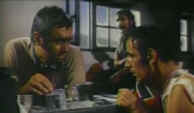

In contrast to the film's larger framing story, which takes place in the dazzling, majestic outdoors, the Hooky subplot unfolds inside the cramped, gloomy hospital. We first see Hook lounging prone in his bunk, playing a shell game with someone and chatting sardonically with someone else. The man in the bunk below Hook's is delirious with fever and begins raving. Hook shouts, "shut up, you cripple!" and hits the man in the face with a utility belt. Later, in furious exasperation, Hook shakes the sick man until someone intervenes. When accused of not caring whether the man lives or dies, Hook callously agrees. Despite this repulsive behavior, Hooky's spirited personality and humorous intelligence give him a strange glamour.
He begins to seem more vulnerable and sympathetic in his next scene. This starts with a wonderful bit of physical business, the clownish parody of a salute with which Hook greets Surgeon Reynolds, who replies, in dry dismay, "Hook, not you again." Hooky complains of "pretty terrible pain" in his arm. Reynolds demands to examine him at once. Taken aback, but with a great show of suffering, Hook lifts his undershirt and exposes his back to the surgeon, who says the problem is a boil.
``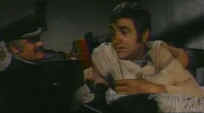

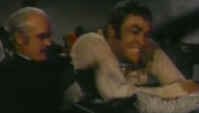
Reynolds chatters away about boils but Hooky isn't really listening until Reynolds shows him a scalpel. Chastened and laughing nervously, Hooky asks for some medicinal brandy instead. "Brandy's for heroes, Mr. Hook," the surgeon hisses fiercely, trilling his r's and shoving Hooky back into position against the bunk. "The rest of you will have to make do with boils in your skin, flies in your meat, and dysentery in your bellies. Now...this is going to hurt you a lot more than it will me, I'm happy to say." As he listens to this sadistic little speech Hooky's face darkens with dread. Then Reynolds applies the scalpel, and the scene ends with Hooky wincing and sniveling in pain.
Hook's third scene is long and informative, key to the subplot and a nonstop tour de force of physical acting on the part of James Booth. It starts with Hooky bursting noisily into the ward while pulling up his pants (with a clear implication of returning from the latrine). The prudish Miss Witt is there, nursing the ailing Sgt. Maxfield.




Her presence moves Hooky to playful gallantry, which she ignores.
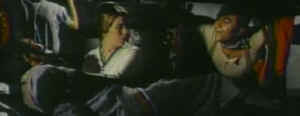
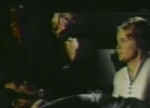
Half-jokingly, half-threateningly , he promises to "look after" Maxfield. Miss Witt announces that the patients will all be evacuated soon in the wagons. She's talking to everybody, but she looks mostly at Hooky. Picking unselfconsciously at a huge
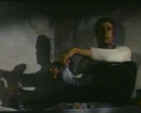


hole in his sock, he asks "Who says?" When she replies "My father, " Hooky sneeringly dismisses her father's authority as he folds the sock over his bare toes and puts his boot back on.
At this point another soldier, 612 Williams, arrives in combat gear. He gives Hooky a rifle and tells him they have orders to defend the room together. Hooky objects because he is "sick" and thus "excused duty." (The vitality of his movements at that moment provides a droll irony.) He starts dressing to leave (admittedly this doesn't make much sense--why leave the hospital if you're sick, and where could he go anyway?) when the formerly delirious Sgt. Maxfield struggles out of his sickbed, throws the rifle in Hooky's face, and orders him to stay and help Williams.
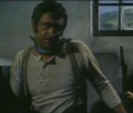
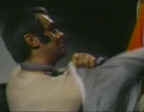
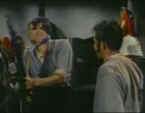
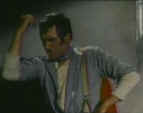
Slowly, grudgingly, Hooky returns to his post. Whipping the bayonet out of its scabbard and leaning saucily against his bunk, one arm akimbo, he utters those memorable lines, "What for? Did I ever see a Zulu walk down the city road? No! So what am I doin' here?" And he tosses the bayonet back onto his bed in disgust.
Then Maxfield, tightly-wound and monomaniacal, starts explaining how Hooky was and is a thief. To this Hooky replies, with quiet dignity, "Look, you got me twenty-eight days field punishment in Brecon. Isn't that enough? Huh?" But Hooky does obey the order to pick up the bayonet and help Williams make loopholes in the wall--until Maxfield, ever dissatisfied, bellows, "And put your tunic on!" Hooky turns round to face him with a look that could peel paint, and at that moment Maxfield faints dead away on the floor.

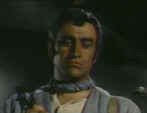

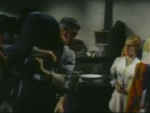

Slowly, bayonet still in hand, Hooky walks over to where Maxfield fell and stands astride his prostrate body. Miss Witt looks on in horror, wondering what Hook's going to do next, and clearly expecting the worst (which brings a hint of a smile to his lips). He puts down the bayonet. He hauls the inert Maxfield up from the floor and looks into his face for a moment...a long, silent moment. Then he hoists Maxfield over his shoulder and tells Miss Witt a key detail in the story of their feud: Having stopped Hooky's pay for the twenty-eight days of his field punishment, Maxfield sent money to Hooky's wife. To Miss Witt's surprise, Hooky considers this prima facie unforgivable. "What do you want me do " he asks her rhetorically. "Cry me heart out? Give him a big kiss?" As he talks, Hooky spanks Maxfield, carries him across the room, puts him into bed, and kisses him on the head. Miss Witt walks out in a huff, pausing just long enough to reply, indignantly, "I thought you might pray for him." She shuts the door behind her and Hooky chuckles, "She's a dry one. Very cool. " Then, giving his
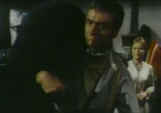
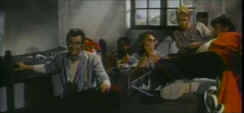
bayonet blade a lewd fondle, he adds, "Know what she needs." Miss Witt, eavesdropping outside the door, hears someone say, "Play your cards right, Hooky, it could be you." The men all laugh.
How do I love this scene? Let me count the ways. I love the comical grossness of the latrine and sock motifs. I love the references to Hooky's enviable "missus" and the understated indications that Miss Witt secretly likes him. And I really love the relationship between Hook and Maxfield, with its subtle but kinky homoeroticism. ( Lots of touching, and "field punishment" is outdoor bondage.) I love--make that madly adore--Hooky's jaunty insouciance. Most of all I love James Booth's marvelous physical acting, which does so much to create these effects, to carry the scene and produce its central irony. Though Hook's superiors consider him a coward and scoundrel, he's obviously fearless, physically powerful, and much more good than evil. The most satisfying surprise, writes Anna Thomas, is the one that seems inevitable. Hooky’s spectacular display of heroism, when it finally arrives, is so gratifying precisely because it doesn't come out of the blue, but rather is the fulfillment of our half-conscious expectations.
Hooky initially allows himself to be drawn into the fighting when Williams, who has no authority over Hook, appeals for his help man-to-man. Hooky responds instantly to this plea after resisting every previous attempt to motivate him. He saves Williams's life with a timely rifle blast and, considering his duty done, decides to abandon his post in the
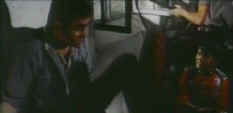
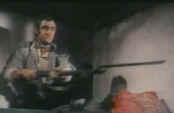

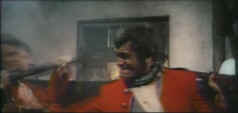
hospital, which soon catches fire. On his way to the exit he sees the outer door giving way under the Zulu assault. He hurries back into the ward, shuts the door behind him, and braces it with a bunk bed and his own body, while directing some other men to dig a hole through the wall to the next room. Hook holds off the Zulus till the room has been evacuated. He then backs out through the hole, while Zulus pour into the room after him. He continues to fight while the others escape, and he's about to make his own escape when Maxfield, immobile on the floor, screams for Hook's help. "What about the money you sent my old woman?" Hooky barks with a scowl. But Maxfield desperately

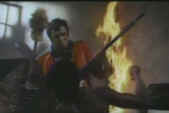
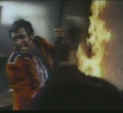
screams his name, and Hooky struggles back through the hole into the burning room. More Zulus pour in and beset him, but Hooky is an aggressive fighter, always on the offensive, and battles his way to Maxfield's side. He's lost his gun and is starting to weaken in a hand-to-hand struggle when Williams arrives and saves Hooky's life by shooting his adversary. This would be a great time to get out, but Hooky picks up a spear and continues killing Zulus as if it were an end in itself, while Maxfield, still imperiled on the floor, chortles over having finally made a soldier of him. Eventually Williams seizes Hooky by the scruff and drags him toward the exit hole just in time to miss the collapse of the roof, which kills Maxfield.
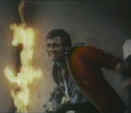
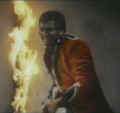
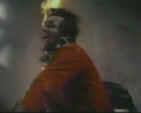
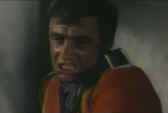
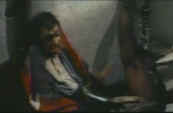
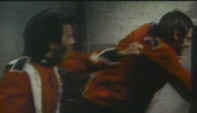
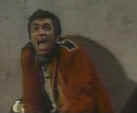
The climax of the Hooky subplot occurs during the celebrated brandy-drinking scene. Though Hooky is amusingly funky earlier (boil, latrine, sock), here he is freighted with extravagant spiritual meaning and glorified almost to apotheosis. He’s running for his life through the burning hospital when he passes the cabinet containing the medicinal brandy he wanted earlier--the brandy the surgeon said was "for heroes." He smashes the glass door and takes the bottle. Williams returns and warns him, "That's a flogging offense! Get out for God's sake, man!" Suddenly Hooky turns all sublime and Promethean. Surrounded by leaping flames, his grime-streaked face blazing with power and defiance, his torn red tunic glowing in the firelight, he smashes the bottle open with one blow and very deliberately raises the jagged opening to his lips for a deep, ecstatic draught that leaves him shuddering.
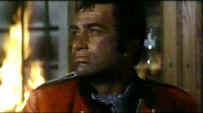
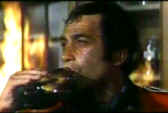
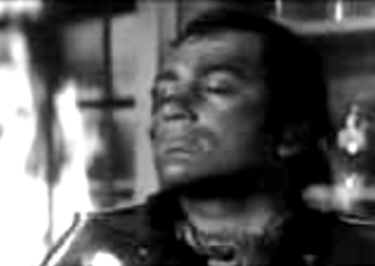
Wow! That scene is so fantastically beautiful it gives me chills to this day. It reminds me of Gericault or Beethoven, with overtones of Nietzsche, Rousseau, Blake, and 19th Century romanticism generally. It suggests that Hooky recognizes the supreme event in his predominantly loser's life, and it also somehow makes him seem magnificently free on the inside, noble and exemplary.
Just in case anybody still doesn't get it, Zulu gives us a couple of glimpses of Hook standing at the rampart in the darkness, with Williams beside him, watching the hospital burn. "Look at that," Hook says bleakly. "Do you think he wanted it that way?" He's talking about Maxfield. In other words, way back in the first scene, when he said he wouldn't care if Maxfield were dead, he didn't really mean it. He cares and he feels bad.
But don't break out the violins. Immediately after the battle, Hooky resumes his malingering. He's last seen carving his name in the church wall and spitting on the floor.

* * * * *
I saw Zulu for the first time in the summer of 1964 at a drive-in. I was twelve. Coming as it did on the eve of my adolescence, the experience changed my life. I was enthralled by the film as a whole and electrified by Hooky, who to me embodied a state of grace and the ultimate in manliness. About halfway through the movie I started shaking, and I couldn't stop. I rode home in the back of the family station wagon trembling with arousal and exaltation. I felt that Zulu wasn't just a great work of art, but something special, something sacred.
The Battle of Rorke's Drift has been captivating people ever since it occurred. Deemed "immortal" by Queen Victoria, commemorated and celebrated out of all proportion to its negligible geopolitical impact, it seems to stir the imagination and inspire strong emotional reactions.
Stanley Baker was so determined to make a film about the battle that he financed Zulu with his own money. Zulu was an instant smash hit and has become a television perennial and the chief portal through which people now get sucked into the cult of Rorke's Drift. In fact, the battle and the film are worshipped more or less in tandem. Go to the Internet and try searching on "Rorke's Drift" or Zulu. The links go on forever. Amateur reviews of Zulu posted on www.amazon.com and www.imdb.com are passionate, filled with superlatives and words like "cherish."
Many aficionados are baby boomers who discovered the film as kids and maintained their enthusiasm into adulthood. (Such was the case with me.) Others are career soldiers, military buffs, war gamers, historians, British patriots, and the children of fans (Zulu appeals strongly to kids!). I don't know how big the total market is, but a surprising number of specialized goods and services are aimed at it (see eBay.com). These include film memorabilia, videos, CDs, books, and games; Rorke's Drift "play-sets" complete with miniature hospitals, plastic mealie-bag redoubts, and toy soldiers; Zulu art and artifacts; fine art prints of paintings depicting the battle (there are many, both antique and recent); uniforms and weapons; battlefield relics and tours; battle re-enactments by groups like the Die Hards and the Victorian Military Society; and a dedicated Rorke's Drift website (www.rorkesdriftvc.com). All of this is completely grassroots in origin and innocent of corporate taint.
While that's refreshing--the Zulu cult may be one of the few unsullied underground phenomena left--it has led to some glaring merchandise gaps. For years, no "making-of-Zulu" book or film was available, although anyone who owns Zulu would almost certainly want such products. Recently, however, this has begun to change. An original "making-of-Zulu" film has finally surfaced, although copyright issues have prevented release and public screenings. In addition, a brand-new "making-of" film and companion book are currently in production, with release scheduled for 2003 or 2004. These efforts come rather late in the day, considering that many of the key people from the film are now dead (including Stanley Baker, Jack Hawkins, Ulla Jacobssen, and Nigel Green. ) But James Booth is still alive and has been interviewed for the new film and companion book.
Appendices
The Battle of Rorke's Drift
. . .by Randol VV. Hooper
Color Lobby Cards (set of 8?)
B&W Publicity Stills (set of 8)
James Booth bio w/B&W photo of Hook w/assegai
Field Punishment: http://www.spartacus.schoolnet.co.uk/FWWfield.htm (59.9 kB)
